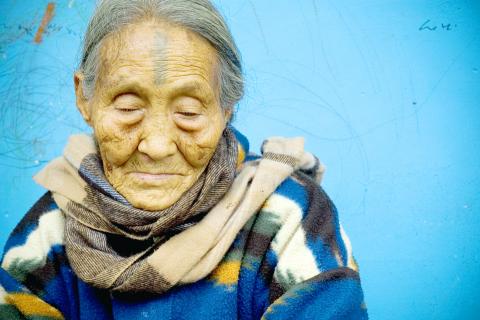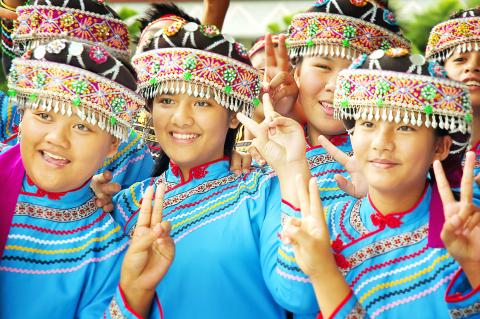While growing up in the US, Tony Coolidge (陳華友) was told very little about his Taiwanese mother’s background.
“She went through great pains to bring us up American, to keep us speaking English so we could succeed, so we could adapt and fit in,” he says.
After his mother’s death from cancer in 1994, Coolidge visited Taiwan to reconnect with her relatives — and made a life-changing discovery. On a trip to his mom’s hometown of Wulai (烏來) in New Taipei City, Coolidge found out that she was a member of the Atayal tribe. Up to that point, he had never even heard of Taiwanese Aboriginals.

Photo Courtesy of Voices in the Clouds
Coolidge’s quest to find out more about his family’s Aboriginal background — and why it had been hidden from him — is the subject of Voices in the Clouds (眾族同聲), a documentary by director Aaron Hose. Released last year, the film will be shown with Chinese subtitles for the first time at the Urban Nomad Festival’s closing night on Sunday, followed by a question-and-answer session with Coolidge.
Coolidge recalls that on his trip, the topic of his family’s background did not come up until he questioned his aunt about the Aboriginal art he saw on the streets of Wulai.
“I thought, ‘What were Native Americans doing here?’ That’s what it looked like to me,” Coolidge told the Taipei Times on Tuesday. “And then she told me, ‘No, that’s our tribe.’ I thought, ‘Our tribe? Atayal?’ I was surprised, shocked.”

Photo Courtesy of Voices in the Clouds
Back home, Coolidge started researching the tribal group’s history. A magazine article he wrote about his trip caught the attention of filmmaker Aaron Hose.
“The fact that while he was visiting Wulai, he discovered that his entire family are descendants of the Atayal tribe, this blew me away,” Hose wrote in an e-mail. “Like Tony, I, too, was surprised that he hadn’t ever heard about it from his mother.”
In late 2005, Hose and his filmmaking team followed Coolidge and his brother Steven on a return trip to Taiwan. Voices is a moving account of Coolidge’s journey to learn more about his ethnic identity. At the same time, it casts a light on the persecution suffered by Taiwanese Aboriginal tribes.
As he found out more about the challenges faced by Aborigines, Coolidge began to understand why his mother never talked about her background. In the film, one Aboriginal elder recalls having to take on different identities in succession: tribal, Japanese, Chinese and Taiwanese. A father describes how classmates labeled his young son a “barbarian.”
“When I first went, it was very evident that there was not a lot of pride about the culture,” Coolidge says. “To me, it was a total avoidance of that culture, in my own family and my relatives. Throughout Taiwan, I got the sense that there wasn’t a positive attitude toward indigenous cultures or people.”
The son of an American GI who left his mother before his birth, Coolidge was born in Taiwan but immigrated to the US when he was a small boy. He grew up on military bases around the world with his mother, stepfather and three younger siblings.
Though she kept her ethnicity hidden from him, Coolidge knew his mother missed Taiwan and dreamed of returning before she was diagnosed with cancer. In a poignant scene, Coolidge recalls a time when he tried to ease his ailing mother’s homesickness by taking her to a Florida amusement park called Splendid China.
Two years later, after she passed away, Coolidge made his first trip to Taiwan as an adult. “After she died, my quest was not about discovering her culture, but about going and reconnecting with her family and bringing back her spirit in a way,” Coolidge says. “Only I discovered something totally unexpected.”
Coolidge says he can relate to the bigotry faced by his Atayal relatives because of the discrimination he experienced as an Asian American. In the American south, his mother and stepfather were viewed negatively for being a mixed-race couple; at school, his classmates taunted him with fake kung fu moves and “ching chong” noises.
“I can’t say I fully understand what my mother went through, but I understand what discrimination was like,” Coolidge says. “It gave me an understanding of why she did what she did to fit in with mainstream culture.”
Despite language and cultural barriers, Coolidge says he has always felt welcomed in Taiwan. He now lives in Tainan with his wife, Shu-min Hsu Coolidge (徐淑敏), and their three children.
In the film, Shu-min is candid about the misconceptions she had about Taiwanese Aborigines before accompanying her husband on his journey of discovery. Voices in the Clouds was made for American audiences, but Coolidge and Hose hope it will give Taiwanese people a chance to reflect on their country’s complex, multi-layered ethnic heritage.
Hose says that when the film was screened at US film festivals, several Taiwanese-born audience members told him that they, like Coolidge, were surprised to find out about their home country’s Aboriginal tribes.
“I figured, ‘How are we ever going to help preserve a dying culture if people from their own country don’t even know the culture exists?’” Hose said. “Raising awareness is the first step on a long road toward preservation.”
“It’s from having a strong sense of belonging that you have a foundation to move forward in your life,” Coolidge added.

Taiwan has next to no political engagement in Myanmar, either with the ruling military junta nor the dozens of armed groups who’ve in the last five years taken over around two-thirds of the nation’s territory in a sprawling, patchwork civil war. But early last month, the leader of one relatively minor Burmese revolutionary faction, General Nerdah Bomya, who is also an alleged war criminal, made a low key visit to Taipei, where he met with a member of President William Lai’s (賴清德) staff, a retired Taiwanese military official and several academics. “I feel like Taiwan is a good example of

March 2 to March 8 Gunfire rang out along the shore of the frontline island of Lieyu (烈嶼) on a foggy afternoon on March 7, 1987. By the time it was over, about 20 unarmed Vietnamese refugees — men, women, elderly and children — were dead. They were hastily buried, followed by decades of silence. Months later, opposition politicians and journalists tried to uncover what had happened, but conflicting accounts only deepened the confusion. One version suggested that government troops had mistakenly killed their own operatives attempting to return home from Vietnam. The military maintained that the

Before the last section of the round-the-island railway was electrified, one old blue train still chugged back and forth between Pingtung County’s Fangliao (枋寮) and Taitung (台東) stations once a day. It was so slow, was so hot (it had no air conditioning) and covered such a short distance, that the low fare still failed to attract many riders. This relic of the past was finally retired when the South Link Line was fully electrified on Dec. 23, 2020. A wave of nostalgia surrounded the termination of the Ordinary Train service, as these train carriages had been in use for decades

Lori Sepich smoked for years and sometimes skipped taking her blood pressure medicine. But she never thought she’d have a heart attack. The possibility “just wasn’t registering with me,” said the 64-year-old from Memphis, Tennessee, who suffered two of them 13 years apart. She’s far from alone. More than 60 million women in the US live with cardiovascular disease, which includes heart disease as well as stroke, heart failure and atrial fibrillation. And despite the myth that heart attacks mostly strike men, women are vulnerable too. Overall in the US, 1 in 5 women dies of cardiovascular disease each year, 37,000 of them